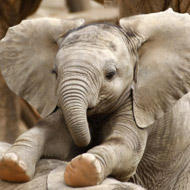
Elephants Lake will help former logging animals
A sanctuary is under construction in Myanmar, South East Asia, to prevent “unemployed” elephants from being killed or having to suffer as tourist attractions.
International animal welfare organisation FOUR PAWS said that logging restrictions and bans on exports in Myanmar have seen some 1,000 elephants rendered “jobless”. In the 17,000-hectare ‘Elephants Lake’, veterinary surgeons and experts will rehabilitate former logging elephants and get them ready for life in the wild.
For decades, severely abused elephants in Myanmar have been used to help with felling and carrying heavy tree trunks. But since the introduction of strict environmental regulations, the demand for teak has diminished, leaving around 1,000 elephants effectively redundant.
“It sounds harsh, but for their owners, the elephants are now useless and on top of that a financial burden,” explains FOUR PAWS vet and project leader Dr Amir Khalil. “The animals are therefore either killed or sold to the tourism industry.
'Unfortunately, elephant riding is still a fun holiday activity for a lot of people. These magnificent, endangered animals do not deserve death or an equally cruel career change. At our first elephant sanctuary in the Bago Region, the animals can recover from the exertions of their past and, ideally, be reintroduced to the wild.”
In addition to ex-logging elephants, the sanctuary will also provide care for orphaned or injured wild elephants. With an on-site orphanage and mobile clinic, the sanctuary aims to bring together new prides and later release them into a nearby forest reserve.
When built, Elephants Lake will be one of the largest elephant sanctuaries in Southeast Asia. It is expected to take in its first influx of elephants at the end of 2018 and hopes to rehabilitate around 300 over the next 10 years.



 The Animal and Plant Health Agency (APHA) has updated its online reporting service for dead wild birds.
The Animal and Plant Health Agency (APHA) has updated its online reporting service for dead wild birds.